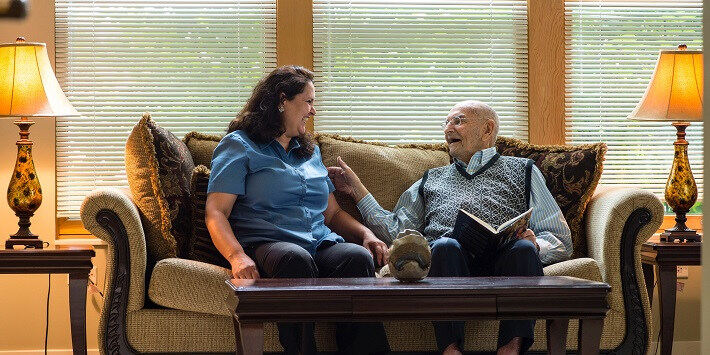
No matter their needs or preferences, there is a senior living facility designed specifically for them. Finding one is all about finding one that works with both their budget and needs.
Residents pay a monthly fee that covers rent, amenities, services, and care support services. Residents may be eligible to offset costs through Medicaid or long-term care insurance policies.
What is Assisted Living?
Assisted living may be an appropriate solution for seniors who require more assistance than friends or family can offer, yet don’t want to move into a nursing home. These residences typically feature caregivers available 24/7 to assist residents in daily activities as well as health services like doctor appointments and medication monitoring.
Residents typically live in private apartments where they are free to decorate however they like. Three meals a day are provided and housekeeping and transportation services may also be included as part of the monthly fee. Residents are also encouraged to participate in community social and recreational activities which may prove especially helpful in combatting cognitive decline.
Elders in need of extra assistance with daily living activities or who experience frequent falls may benefit from moving into an assisted living community. Here, caregivers are on hand to assist with tasks like bathing, dressing and taking medications; using the toilet; as well as providing help going to the bathroom.
Residents pay a monthly fee that covers rent, services, and amenities – using funds from savings accounts, pensions long-term care insurance, or VA benefits as needed to cover this expense. Furthermore, these communities promote healthy lifestyles through nutritious meals, engaging activities, and an emphasis on residents’ wellbeing.
How Does Assisted Living Work?
Assisted living services are typically offered within residential facilities such as converted homes, apartments, schools, or other types of buildings. Residents typically live in individual rooms while using common areas for socializing and recreation purposes. Three meals are typically included daily with additional health services available on-site such as physical therapy or other forms of health care available as needed.
Assisted living residences typically charge their residents a monthly fee that covers rent, amenities, and services. Payment can come from personal funds, sales proceeds from home sales, or income from pensions or Social Security benefits. Some communities accept long-term care insurance or the VA Aid and Attendance benefit to cover additional costs for eligible seniors.
Many seniors move into assisted living because they no longer fulfill the responsibilities associated with home ownership, such as cooking, cleaning, and raking leaves. Furthermore, these communities may provide transportation services so residents can get to appointments or enjoy themselves outside the community.
If your loved one is considering assisted living, be sure to visit several facilities and ask plenty of questions. Be mindful of how staff interacts with residents; observe staff interactions between residents, and observe any signs of happiness and satisfaction from both. Be wary of billing policies such as payment and credit policies as well as billing and payment procedures before selecting an assisted living community for a senior. Finally, prepare legal documents like power of attorney documents, advance directives, and wills before moving in for residency.
What Are the Benefits of Assisted Living?
Although assisted living does not compare with independent living, its many benefits can improve the quality of life for residents. Residents pay a monthly fee that covers rent, amenities, and services provided; this expense can be covered either with their own funds, proceeds from selling their home, Social Security income/pension income/long-term care insurance funds/SSI payments from beneficiaries (in some communities this option also exists), or by using funds received as Social Security income/pension income/long-term care insurance payments against costs for seniors eligible for assistance.
Residents receive personalized plans of assistance that include assistance with daily tasks like medication reminders, bathing, and dressing. Staff is typically on-hand throughout the day and night to offer support and promote independence for residents while helping them explore their interests and make new friends through community programs, events, and social activities.
Seniors can select their ideal living solution from an array of apartments, suites, or homes according to their specific needs and preferences. Enjoy low-maintenance lifestyles while accessing luxury amenities, wellness resources, and warm and welcoming neighbors – these all make for ideal living arrangements for seniors!
Seniors requiring 24/7 care may not find assisted living a suitable option. As soon as their medical condition requires more than nonmedical assistance and supervision, nursing homes may become necessary. For those searching for alternatives to nursing homes, the American Council on Aging offers its free Medicaid Eligibility Test which can give an indication of which options may exist.
What Are the Drawbacks of Assisted Living?
Assisted living may be seen as a last resort and may be difficult for seniors who live alone and find maintaining their homes difficult. Furthermore, adapting to living with other elderly people as well as the rules and policies of an assisted living facility may prove challenging.
These facilities provide plenty of activities to keep their residents occupied, such as games nights, outings, exercise classes, and crafts. Plus they provide seniors a great place to socialize and meet new people!
Many facilities are designed to resemble homes, featuring amenities like lower countertops and accessible showers that cater specifically to senior citizens’ needs. As these homes are more equipped to care for those at risk from falls or Alzheimer’s than traditional private ones, these institutions often provide safer living arrangements than most private houses do.
However, it should be remembered that these facilities do not provide comprehensive on-site medical care; those needing extensive attention will typically need to visit offsite doctors or hospitals instead. Nursing homes might provide more personalized assistance.


